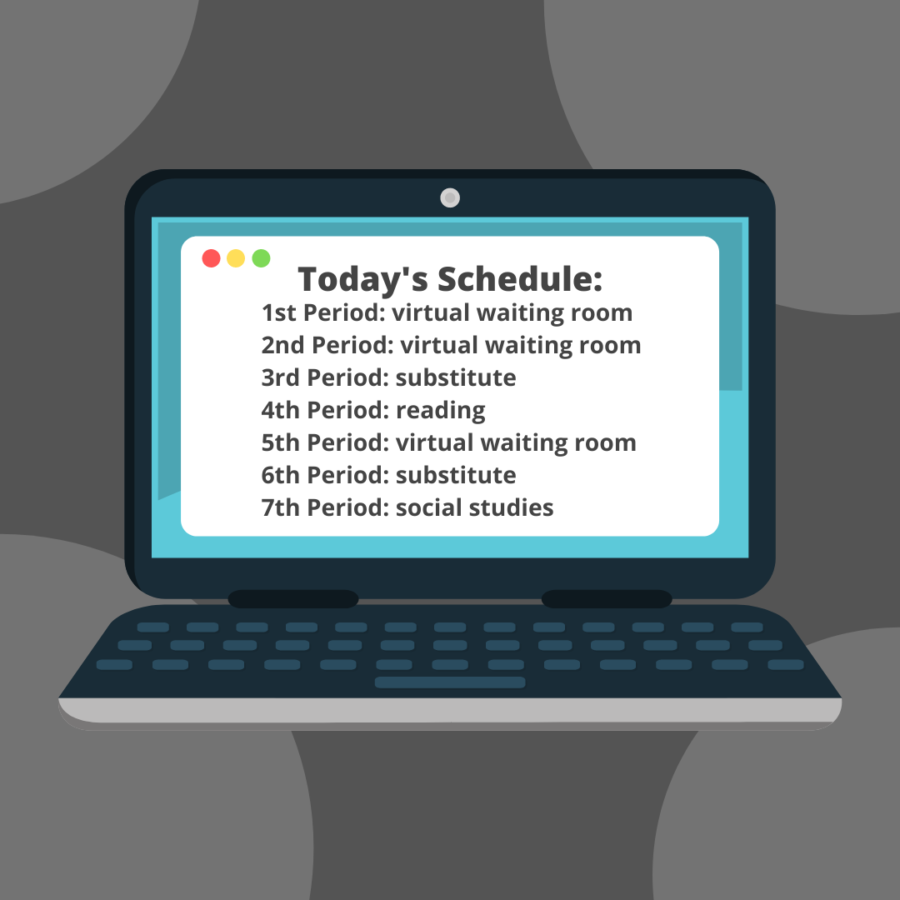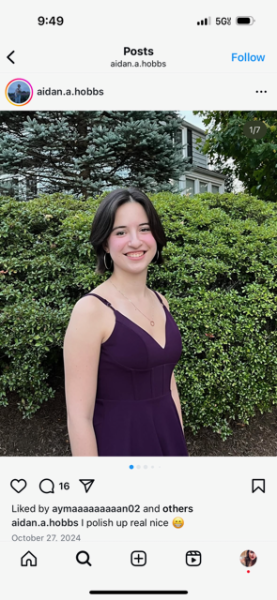APS virtual learning program off to a rickety start
Students and parents face disorganization and teacher shortages
Summer vacation is over and a student is ready to get started on the new virtual school year. But as it turns out, he does not have any teachers to teach him or a schedule for the day. This is the reality that 340 Arlington Public Schools (APS) students faced in the first week of September according to arlnow.com.
What happened?
In the 2021-22 school year, APS is providing an online option for elementary, middle, and high schools called the Virtual Learning Program (VLP). During the first week of school, numerous students and parents reported missing teachers from their schedules. For many, this continued for weeks. W-L math teacher Mr. Joshua Folb, father to a VLP sixth grader, reported that his son did not receive a substitute for his math class until the end of September.
“I was really disappointed at the rocky start and lack of attention it was given as a program,” Mr. Folb said. “They thought they’d have a schedule, and then the schedule would just up and change. Parents weren’t told, the kids weren’t told, they would just log into Canvas one day and then it would say ‘this is your new class and this is your new teacher.’”
When students did not have an instructor for a class, they would be given a substitute or sent to a “virtual waiting room”, where they would spend the entirety of class and possibly the school day.
“Sometimes my daughter may receive a link, not always, but when they have a link, she will go use it and check in. Sometimes there’s a substitute there and sometimes there’s not. When she did have a reading substitute she was just told to read a book,” parent Elizabeth Fabrizio said. “It’s completely inadequate. Some days my daughter refuses to even click on the link for the reading class because she knows there’s no point.”
In compliance with federal law, APS offers 504 plans, which grant students with mental or physical impairments extra assistance, provided they meet the qualifications. Fabrizio says her daughter did not receive accommodations for her 504 plan in virtual school, which should have enabled her things like repeated instruction and extra time on tests.
“I noticed in the first two weeks that her teachers were not giving these accommodations,” Fabrizio said. “I emailed a copy of my daughter’s 504 plan to all of them and when I heard back from the teachers, they said they had not received it before and thanked me. They also started doing the accommodations for an IEP [Individualized Education Plan]. There are specific hours that students are mandated to receive from the school district and they have not been receiving this. There’s a wide variety of services that aren’t being provided.” In response, APS said in a town hall that IEP support would be provided once a special education teacher is hired.
Communication with APS has been a common issue among parents. Tia Alfred’s daughter, a high school junior, only had two teachers after the first month of school. Some students like her were issued access to third-party resources like Ingenuity and Virtual Virginia, though she was not.
“After I found out that she was supposed to be in these classes, I repeatedly requested the login information so that she could get in,” Alfred said. “I attended the September 30th school board meeting and was finally able to track them down and get a hold of access, but that evening when she went to try it out it still didn’t work. She said that while her peers are preparing for SATs, she can’t even get into her class. It’s very overwhelming with no instruction, having to guide yourself.”
Alfred got in touch with APS in July. A month later she was informed that they were experiencing scheduling and communication issues, and was promised a fix by September 20, however, by October, the issue was not fixed.
“Parents are extremely frustrated,” Fabrizio said. “Some of them have resorted to private tutors, online programs, and even homeschooling to make up the difference. Although, not all kids are privileged enough to have those resources.”
The Superintendent of Arlington Public Schools, Dr. Francisco Durán, attributed these problems to challenges in hiring staff.
“We had a challenge in hiring staff for all the different courses that were needed,” Durán said. “At the high school level, classes become more specific to the student. We’re in a situation where there’s only 175 high school students. When you have a very small number like that, and have courses that people need to graduate, you can’t have a teacher for every class. For students with disabilities, we had to go to an outside contractor to find certified special education teachers. This year has been extremely difficult, not just in Arlington, but all over the country for hiring staff. It should not have happened, and it’s really unfortunate that it did, but that’s where we were.”
The APS budget for the 2022 fiscal year, created in June of 2021, originally allotted 109 school-based positions for virtual school. By the second week of school there were only 92, according to Arlington Now.
“Speaking as a parent, I don’t think the program got the attention it needed fast enough,” Mr. Folb said. “When something goes wrong in a regular school, 1000 kids pull out their phones, footage gets everywhere. The VLP program, being online, feels like it was really easy to sweep under the rug.”
Why Do We Have The Virtual Learning Program?
While the majority of APS students returned to in-person school, the purpose of the VLP was to provide an alternative option for a multitude of reasons such as being unable to get vaccinated.
“My daughter is not old enough to be vaccinated so we had a lot of concerns,” Fabrizio said. “She did well in virtual last year, so we thought it would be better to be safe. She does well when she can interact directly with her class, which is part of the reason why it worked so well last year.”
At the end of October, the United States Food and Drug Administration (FDA) approved the usage of the Pfizer-BioNTech COVID-19 Vaccine for children ages 5 to 11. For some, however, the VLP has provided opportunities to people for non-COVID-19 related reasons.
“I wanted to go into virtual because attending in person was extremely difficult to maintain,” said senior Kieran Stevens. Stevens has Postural Orthostatic Tachycardia Syndrome and Ehlers-Danlos Syndrome (POTS & EDS). “It was hard to pay attention in class when I was having health problems, specifically with my lungs, which made it really hard for me to breathe with a mask on.”
Students like Stevens have an opportunity to learn at a different pace in the VLP. Some students prefer the straightforwardness of online instruction over moving around in a building.
“So far, it’s been pretty good,” Stevens said. “Because of the teacher shortage, I have two classes through Virtual Virginia, and honestly, it’s pretty organized. I like how it reminds you about how many assignments are due, how much you’ve accomplished, and whether you’re pacing yourself well. It already has pre-recorded lessons with the teacher, it’s not just self taught. You can reach out to those teachers and ask for help. I thrive in a format with a more malleable schedule.”
The program can be seen as less of a temporary fix, but rather a way to meet the needs of all different types of students and to change education.
“Traveling through the hallways, classroom to classroom, there are kids who thrive on that,” Folb said. “My son, he’d walk down a hallway, someone would bump into him. They wouldn’t understand the significance, but to him all the little subtleties of getting from one room to another is a terrifying event. He’s not an antisocial kid, he’s very happy to interact with others in a setting he’s comfortable with, but the idea of 1000 people pouring into hallways just doesn’t work. For some kids these social situations are awesome, but not everyone gets value out of that. There’s a laundry list of reasons, like bullying, that keep it from being their ideal environment. We have the opportunity to completely eliminate those anxieties before they feel the need to drop out entirely.”
Moving Forward
By the sixth week of school, multiple of the aforementioned issues were still present. Alfred spoke about her grievances to APS officials at a school board meeting on September 30.
“I reached out to APS since the end of July regarding concerns about the program, but for whatever reason I’ve been misled, misinformed or simply just disregarded,” Alfred said. “I can’t get answers to simple questions, including, ‘what is the proposed date of when this program will be fully functioning.’ We appreciate having the program during the current worldwide pandemic, but they do have an obligation to provide an equitable education to the students. The entire system has failed. It has created emotional distress and unnecessary problems that may have long term effects. I’ve heard APS say that students are the number one priority, but that can’t be true because you’ve failed them by not offering them a quality and equitable education.”
Dr. Durán did not describe the state of the program as fully functional. Durán cited the length of the process it takes to get a newly hired teacher fully administered, including fingerprint collection and background checks.
“I wouldn’t say it’s fully up and running, but it’s on the way there,” Dr. Durán said. “We have a new Virtual Learning principal starting on the 25th of October. For every family that needs one, there will be an IEP meeting. Many students are finally receiving their login information for virtual providers, and for those who are multiple assignments behind, we’re working to reset the courses so that the students have an opportunity to catch up. There should be no negative impact on them on their GPA or anything of that nature. It was not their fault, it was the fault of us not having the needed courses and teachers available.”
While extremely sparse, updates can be found on the program’s website. School board meetings, which are held every two weeks, provide extended details regarding their plan moving forward.
“I think that the program is getting better, at least for some of us,” Fabrizio said. “Some families are preparing to go back to in-person school after their children are vaccinated, but others are staying in the VLP. We’re all very concerned about the students and how APS can make up for what could be a learning loss. I’m extremely grateful that they wanted to give us a virtual option. However, despite the challenges, I’m frustrated at the slowness of the pace of change.”
Arlington Now – https://www.arlnow.com/2021/09/07/staff-shortages-cause-frustrating-and-unacceptable-start-to-new-aps-virtual-learning-program/
School Board Adopted Budget – https://www.apsva.us/wp-content/uploads/2021/10/FY-2022-School-Boards-Adopted-Budget_final.pdf
Virtual Learning Program: Home – https://vlp.apsva.us/
School Board Meetings – https://www.apsva.us/school-board-meetings/watch-school-board-meetings/
VLP Town Hall – https://vlp.apsva.us/post/faq-from-the-vlp-town-hall/










